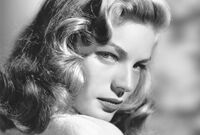Lauren Bacall: Difference between revisions
No edit summary |
No edit summary |
||
| Line 1: | Line 1: | ||
[[File:Lauren Bacall.jpeg | 200px | right | thumb |Lauren Bacall]] | [[File:Lauren Bacall.jpeg | 200px | right | thumb |Lauren Bacall]] | ||
==Relevance== | ==Relevance== | ||
[[Category:Influences on Morrissey - Film and Television]] | |||
{{Page | {{Page | ||
| | |RelatedForumThreads=151874 | ||
|WikipediaPageTitle=Lauren_Bacall | |WikipediaPageTitle=Lauren_Bacall | ||
}} | }} | ||
{{PageDate}} | |||
Latest revision as of 19:40, 5 January 2024
Relevance
Mentioned In
- Headful Of Heroes - NME (September 16, 1989)
- Richard Attenborough dies - true-to-you.net (August 26, 2014)
- SHAKE THE HAND THAT SHOOK THE HAND - Morrissey Central (January 5, 2024)
Wikipedia Information
 |
Betty Joan Perske (September 16, 1924 – August 12, 2014), professionally known as Lauren Bacall ( bə-KAWL), was an American actress. She was named the 20th-greatest female star of classic Hollywood cinema by the American Film Institute. She received an Academy Honorary Award in 2009 in recognition of her contribution to the Golden Age of motion pictures. She was known for her alluring, sultry presence and her distinctive, husky voice. Bacall was one of the last surviving major stars from the Golden Age of Hollywood cinema. Bacall began a career as a model for the Walter Thornton Model Agency before making her film debut at the age of twenty as the leading lady opposite her future husband Humphrey Bogart in To Have and Have Not (1944). She continued in the film noir genre with appearances alongside her new husband in The Big Sleep (1946), Dark Passage (1947), and Key Largo (1948), and she starred in the romantic comedies How to Marry a Millionaire (1953) and Designing Woman (1957). She portrayed the female lead in Written on the Wind (1956), which is considered one of Douglas Sirk's seminal films. She later acted in Harper (1966), Murder on the Orient Express (1974), and The Shootist (1976). She found a career resurgence for her role in the romantic comedy The Mirror Has Two Faces (1996), for which she earned the Golden Globe Award and the Screen Actors Guild Award, in addition to nominations for the Academy Award and the BAFTA Award for Best Supporting Actress. During the final stage of her career, she gained newfound success with a younger audience for major supporting roles in the films Misery (1990), Dogville (2003), Birth (2004), and the English dubs of the animated films Howl's Moving Castle (2004) and Ernest & Celestine (2012). For her work in theatre, she made her Broadway debut in Johnny 2x4 (1942). She went on to win two Tony Awards for Best Actress in a Musical for her performances in Applause (1970) and Woman of the Year (1981). She also acted in the play Goodbye Charlie (1959), the farce Cactus Flower (1965), and Wonderful Town (1977). She made her West End debut in The Applause (1970) followed by Sweet Bird of Youth (1985).
Related Forum Threads
- [Morrissey Central] "SHAKE THE HAND THAT SHOOK THE HAND" (January 5, 2024) - Morrissey-solo (Jan 06, 2024)
